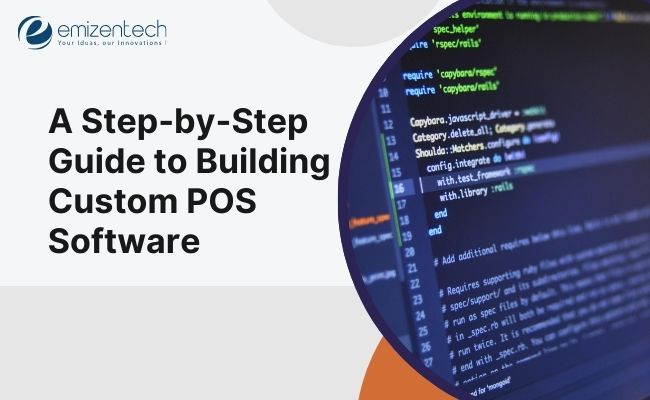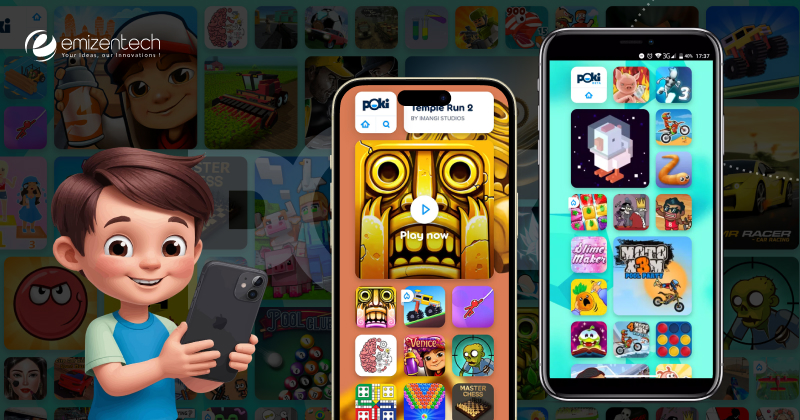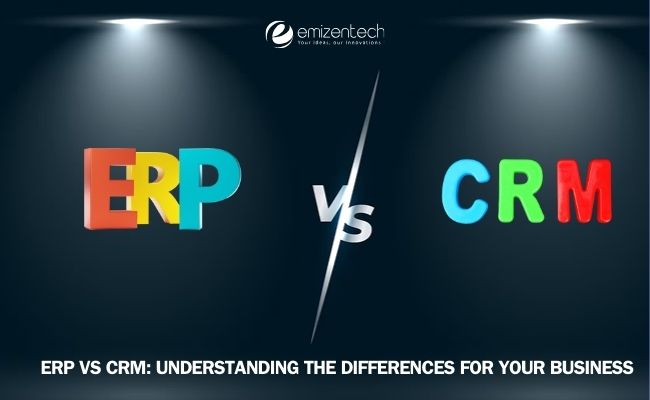A Step-by-Step Guide to Building Custom POS Software

Strong 8k brings an ultra-HD IPTV experience to your living room and your pocket.
In today’s fast-paced retail and hospitality industries, having a reliable and efficient Point of Sale (POS) system is essential. Businesses need a POS solution tailored to their needs rather than a one-size-fits-all option. This is where custom POS software comes in. A well-built POS system can streamline operations, improve customer service, and boost overall efficiency.
Developing custom POS software requires careful planning, a deep understanding of business needs, and the right technology stack. In this guide, we’ll take you through a step-by-step process for building your own POS system. If you’re considering hiring a POS software development company, this guide will also help you understand what to expect.
What is Point of Sale Software?
POS (Point of Sale) software is a digital solution that enables businesses to complete sales transactions efficiently. It helps manage inventory, track sales, generate invoices, and process payments. A modern POS system can integrate with CRM software, accounting tools, and eCommerce platforms to provide a seamless experience.
Market Statistics on POS Systems
- The global POS software market is projected to reach $42.5 billion by 2027, growing at a CAGR of 9.2% from 2022 to 2027.
- Over 60% of businesses have switched to cloud-based POS systems for better efficiency and remote access.
- 90% of retailers believe that an advanced POS system improves customer service and boosts sales.
Step-by-Step Guide to Building Custom POS Software
1. Define Business Requirements
Before diving into development, identify what your business needs from the POS system. Consider factors like:
- Number of sales terminals
- Inventory tracking requirements
- Payment processing needs
- Integration with other systems (CRM, ERP, eCommerce)
2. Design a User-Friendly Interface
A POS system should be easy to use for cashiers, managers, and employees. Key UI/UX considerations include:
- Intuitive navigation
- The simple and clear checkout process
- Customizable dashboard
- Responsive design for tablets and mobile devices
3. Develop Key Features
A robust POS system should include the following essential features:
a) Sales and Billing
- Quick product scanning
- Multiple payment methods (cash, credit, digital wallets)
- Discount and coupon application
b) Inventory Management
- Real-time stock tracking
- Automatic restock notifications
- Supplier management integration
c) Customer Relationship Management (CRM)
- Customer purchase history
- Loyalty programs and rewards
- Personalized promotions
d) Employee Management
- User role management
- Attendance and shift tracking
- Performance Analytics
e) Reporting and Analytics
- Sales reports and trends
- Profit and loss analysis
- Customizable data visualization
4. Ensure Security and Compliance
Security is a critical aspect of any POS system. Ensure compliance with industry standards:
- PCI DSS Compliance for secure payment transactions
- End-to-end encryption to protect customer data
- Role-based access control (RBAC) to restrict unauthorized access
5. Integration with Third-Party Services
To enhance efficiency, integrate your POS system with:
- Accounting software (QuickBooks, Xero)
- E-commerce platforms (Shopify, WooCommerce)
- Marketing tools (Mailchimp, HubSpot)
6. Testing and Quality Assurance
Before launching, perform extensive testing:
- Unit testing for individual components
- Integration testing for system compatibility
- User acceptance testing (UAT) to ensure ease of use
7. Deployment and Training
Once testing is complete, deploy the software on live servers. Provide training sessions for employees to ensure a smooth transition.
8. Post-Launch Support and Maintenance
A POS system needs continuous updates and support. Work with a POS Software Development Company to ensure:
- Regular software updates
- Bug fixes and security patches
- Scalability for future business growth
Essential Features of a Custom POS System
When it comes to running a successful business, having the right tools at your disposal is crucial. One of the most important tools for any retail or service-based business is a Point of Sale (POS) system. A custom POS system, tailored specifically to your business’s needs, can offer a range of benefits that off-the-shelf solutions simply can't match.
In this blog post, we’ll explore the essential features of a custom POS system and why these features can help take your business operations to the next level.
1. Efficient Sales Processing
The primary function of any POS system is to handle sales transactions. A custom POS should support various payment methods, including cash, credit/debit cards, mobile wallets (such as Apple Pay or Google Pay), and even contactless payments. Additionally, it should easily generate invoices and receipts—whether digital or physical—to ensure a smooth, professional transaction every time.
2. Real-Time Inventory Management
A custom POS system should also provide robust inventory management features. This includes tracking your stock levels in real-time, so you always know what's available. With automatic reordering, you can set the system to notify you or even reorder stock when inventory reaches a low threshold. Barcode scanning capabilities will also speed up the checkout process, reducing human error and improving efficiency.
3. Customer Relationship Management (CRM)
Customer loyalty is the lifeblood of many businesses, and your POS system can help you build stronger relationships with your customers. By creating detailed customer profiles, you can track purchase history, and preferences, and even offer personalized discounts or promotions. Custom POS systems can also integrate loyalty programs, helping you reward repeat customers with points or discounts.
4. Employee Management and Monitoring
Managing staff efficiently is crucial for any business. A custom POS system lets you control employee access levels—ensuring that sensitive information is secure while giving staff access to the tools they need. Time clock integration allows employees to easily clock in and out, and some systems even generate payroll reports, streamlining administrative tasks.
5. Comprehensive Sales Analytics and Reporting
In the fast-paced world of business, having access to real-time data is critical. A custom POS system can provide detailed reports and analytics on sales performance, revenue, profit margins, and product performance. These insights allow you to make informed decisions about inventory, pricing, and promotions, ultimately improving your bottom line.
6. Seamless Multi-Channel Integration
As more businesses embrace both in-store and online sales, integrating your POS system with e-commerce platforms is more important than ever. A custom POS can help you synchronize inventory and customer data across multiple sales channels, from your brick-and-mortar location to your online store, ensuring a consistent and seamless experience for your customers.
Best Tech Stacks for POS Software Development
Choosing the right technology stack is crucial for building a reliable POS system:
- Frontend: React.js, Angular, Vue.js
- Backend: Node.js, Django, Spring Boot
- Database: PostgreSQL, MySQL, MongoDB
- Cloud Platforms: AWS, Google Cloud, Azure
- Security Tools: SSL Encryption, OAuth, JWT Authentication
Final Thoughts
Building custom POS software requires thorough planning, the right technology, and proper execution. A tailored POS solution enhances business operations, improves customer experience, and boosts profitability. Whether you're developing the software in-house or partnering with a POS Software Development Company, following these steps will help you build an efficient and scalable POS system.
Investing in custom POS software is a strategic move that can future-proof your business. Start planning today and take control of your retail operations like never before.
Note: IndiBlogHub features both user-submitted and editorial content. We do not verify third-party contributions. Read our Disclaimer and Privacy Policyfor details.







